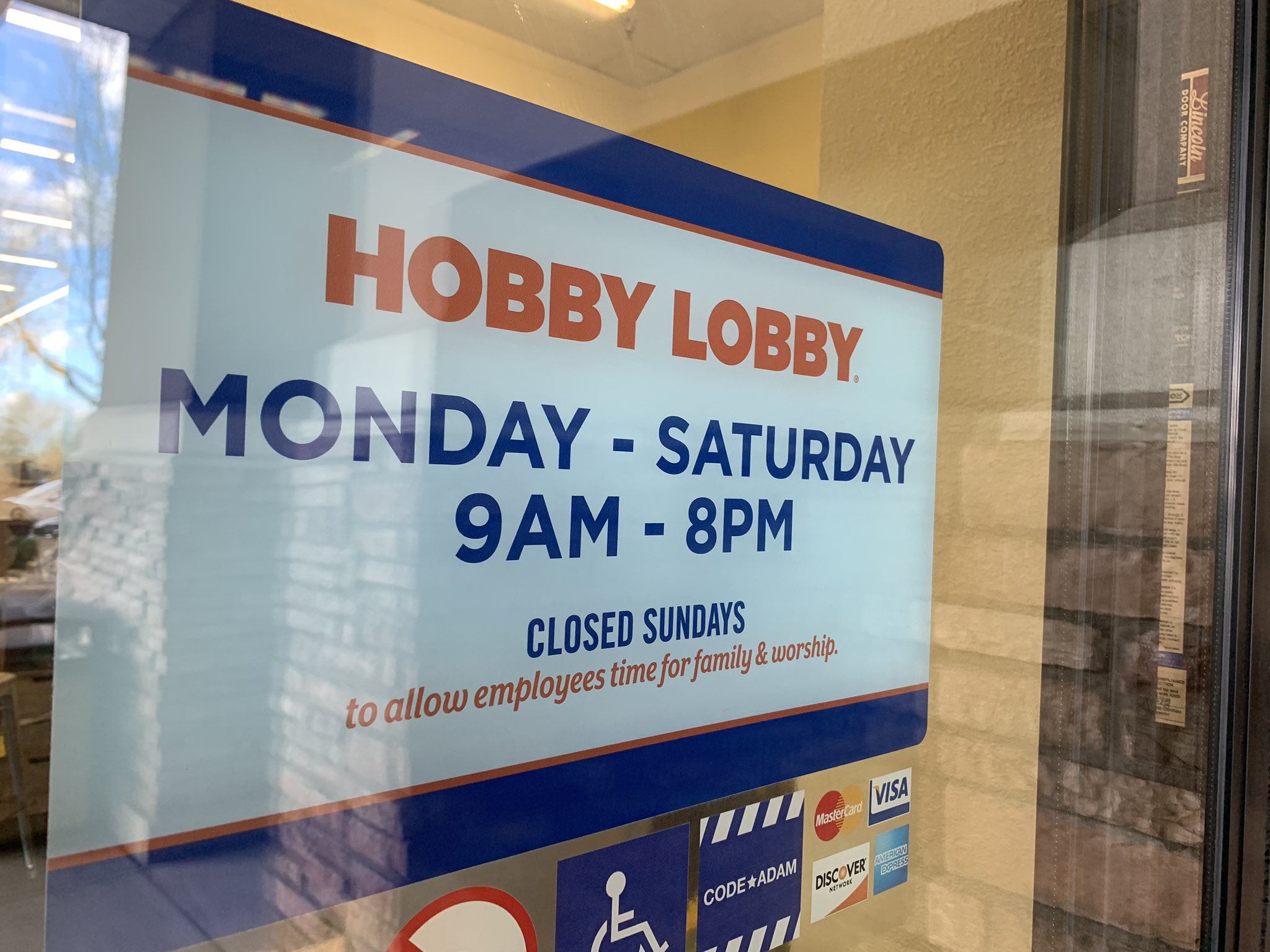Hobby Lobby is a popular American arts and crafts retail chain with over 900 stores across the country. However, devotees of knitting, scrapbooking, and home décor may have noticed something unusual about this retailer – all Hobby Lobby locations are closed on Sundays.

This unique business decision stems from the Christian faith of Hobby Lobby’s founders and owners. Keeping stores shuttered for a day of rest aligns with their religious beliefs. While this weekly closure may inconvenience some customers, it also reflects the priorities and values that have made Hobby Lobby a success.
Hobby Lobby’s Christian Foundations
Hobby Lobby was founded in 1972 by David and Barbara Green, who launched the business out of their Oklahoma City home. As devout evangelical Christians, the Greens sought to operate their company based on biblical principles of integrity, service, and charity.
Central to these values was keeping the Sabbath day holy. For the Greens, Sunday represented a time for worship, family, and renewal separate from worldly concerns. Even as their business grew over the decades, this commitment to honoring the Lord’s Day never wavered.
Religious Freedom Rulings
Hobby Lobby’s devotion to its Christian roots has led to conflict in recent years. Most notably, the company filed suit against the Affordable Care Act’s contraceptive mandate in 2012, arguing that it violated religious liberties.
The subsequent Supreme Court case ruled in Hobby Lobby’s favor, affirming the company’s right to deny insurance coverage for birth control based on its owners’ faith. This reaffirmed the Greens’ prerogative to make values-based decisions in operating their business.
Why Stay Closed on Sundays
For many retailers, remaining open seven days a week is essential to profitability and competing in the marketplace. So why does Hobby Lobby consciously choose to forego Sunday sales?
Setting an Example
The Greens have expressed hope that Hobby Lobby’s Sunday closures will inspire other businesses to give employees a guaranteed day of rest. This notion of setting a positive example reflects the family’s faith-based conviction.
In a media statement, founder David Green explained “We value family…We want to provide them time for rest, worship if they choose, and to give back to their communities.” Honoring the Sabbath allows workers precious time with loved ones.
Employee Satisfaction
In addition to setting a standard, keeping stores closed Sundays directly benefits Hobby Lobby employees. Workers are assured quality time off without worrying about being scheduled.
This perk boosts recruitment and retention. Employees feel valued when employers demonstrate care for their well-being. Hobby Lobby’s Sunday closure helps create positive workplace culture rooted in faith.
Reflecting Values
Shutting down all stores one day every week ensures Hobby Lobby stays true to its founding identity and principles. As a family-led business, maintaining these values is a top priority.
The Greens do not view Sundays as a lost income opportunity or competitive disadvantage. Rather, they see it as a statement of faith and commitment to biblical ideals. Remaining closed on Sundays reflects who Hobby Lobby is at its core.
Impact on Customers
Naturally, Hobby Lobby’s Sunday closure affects shoppers who wish to frequent stores that day. For crafters on tight schedules, this limited accessibility may pose an inconvenience when time is short.
Planning Ahead
Devoted Hobby Lobby fans simply plan around the six-day-a-week availability. Savvy shoppers know to purchase needed items in advance before stores close Saturdays at 8:00PM.
Many regular customers actually appreciate having Sundays set aside for non-shopping activities with family or community. With a bit of preparation, the impact proves relatively minor.
Competitor Options
Of course, arts enthusiasts needing last-minute supplies on Sundays can turn to other national chains like Michaels or Joann Fabrics. There are also local independent shops to explore.
Yet for loyal Hobby Lobby patrons, these alternatives lack the value, selection, and shopping experience only available at their favorite go-to retailer. Most true fans happily adjust rather than substituting elsewhere.
A Successful Strategy
Despite remaining closed 52 days every year, Hobby Lobby continues expanding and thriving financially. This indicates Sunday closure has not negatively affected the bottom line.
Brand Loyalty
In fact, staying true to its values has likely bolstered Hobby Lobby’s brand image and loyalty among many customer segments. Supporters appreciate that biblical principles take priority over profits.
This goodwill translates into sustained sales across the rest of the week, more than offsetting one missed day. Hobby Lobby enjoys some of the highest success metrics in retail, including sales per square foot.
Competitive Difference
Viewed strategically, closing Sundays actually stakes out a competitive advantage no rival can claim. No other national craft retailer builds its identity around Christian values and honoring the Sabbath.
This point of differentiation resonates with underserved faith-based consumer groups. It also provides employees and communities something unique to rally around.
The Future Remains Closed
Despite criticism from some who see Sunday closure as limiting or unfair, Hobby Lobby remains committed for the long term. Founder David Green claims “We will continue to honor the Lord by keeping the doors locked on Sunday.”
An Enduring Legacy
The next generation of family leadership shares this dedication. As long as Hobby Lobby remains a private, family-owned company, Sunday closure will likely persist. It simply reflects who they are and what they stand for.
This unique policy has shaped Hobby Lobby’s identity and culture for a half century. Abandoning it now would mean walking away from their core values and religious roots.
An Inspiring Counter-Culture Model
Hobby Lobby’s stand also serves to inspire other business leaders. Profitability does not necessitate a 24/7 schedule. Their success proves companies can honor faith while effectively competing at a national level.
This counter-culture example gives hope for balancing spiritual values amidst modern corporate pressures. Hobby Lobby may motivate more conscious capitalism. If so, dark Sundays may cast an ongoing positive influence.



